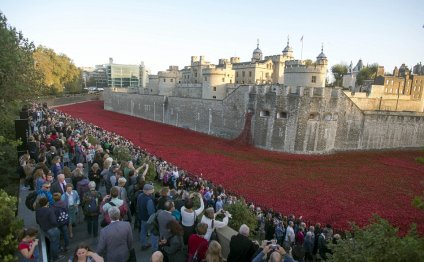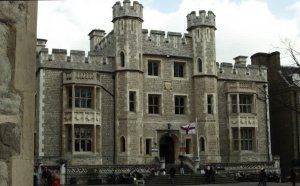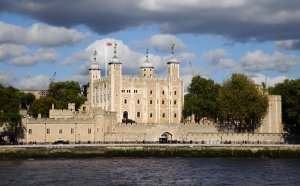
Tower of London moat
The moat is drained in 1845
The Duke of Wellington was Constable of the Tower from 1826 to 1852. Under his invigorating leadership the increasingly smelly and sluggish moat was drained and converted into a dry ditch.
The Waterloo Barracks
The Grand Storehouse was destroyed by fire in 1841. The Duke arranged to clear the rubble and started work on a huge new barracks, to accommodate a thousand men.
The Chartist threat
London 1840s was the scene of rallies and disturbances by Chartists demanding electoral reform. The Tower exerted its traditional role of state power over the people, probably for the last time.
More defences were constructed, including a huge brick and stone bastion that finally succumbed to a Second World War bomb, but the Chartist attack never materialised.
The institutions depart
It was also at the beginning of this century that many of the Tower’s historic institutions departed. The Royal Mint was the first to move out of the castle in 1812, followed by the Menagerie in the 1830s, which grew to become London Zoo. The Office of Ordnance was next to leave in 1855 and finally, the Record Office relocated in 1858.
An increasing interest in the history and archaeology of the Tower led to a process of ‘re-medievalisation’ in an attempt to remove the unsightly offices, storerooms, taverns, and barracks and restore the fortress to its original medieval appearance.
The new ‘medieval’ Tower
The way the Tower looks today is largely thanks to a 19th-century fascination with England’s turbulent and sometimes gruesome history.
In the 1850s, the architect Anthony Salvin, a leading figure in the Gothic Revival, was commissioned to restore the fortress to a more appropriately ‘medieval’ style, making it more pleasing to the Victorian eye – and imagination. Salvin first transformed the Beauchamp Tower to make it suitable for the public display of prisoners’ graffiti, refacing the exterior walls and replacing windows, doorways and battlements.
Video on topic: Tower of London moat



Share this Post
Related posts
Tower of London Castle
The Tower of London is admired for its architecture and its history but it is most remembered for the bloody executions…
Read MoreFacts about The Tower of London
Reference: The Tower of London is a 900-year-old castle and fortress in central London that is notable for housing the crown…
Read More
 A black tiger is a rare colour variant of the tiger and is not a distinct species or geographic subspecies. There are reports and one painting (now lost) of pure black non-striped tigers (true melanistic tigers). Most black mammals are due to the non-agouti...
A black tiger is a rare colour variant of the tiger and is not a distinct species or geographic subspecies. There are reports and one painting (now lost) of pure black non-striped tigers (true melanistic tigers). Most black mammals are due to the non-agouti...
 The Exeter Exchange (popularly known as Exeter Change) was a building on the north side of the Strand in London, with an arcade extending partway across the carriageway. It is most famous for the menagerie that occupied its upper floors for over 50 years, from 1773...
The Exeter Exchange (popularly known as Exeter Change) was a building on the north side of the Strand in London, with an arcade extending partway across the carriageway. It is most famous for the menagerie that occupied its upper floors for over 50 years, from 1773...










